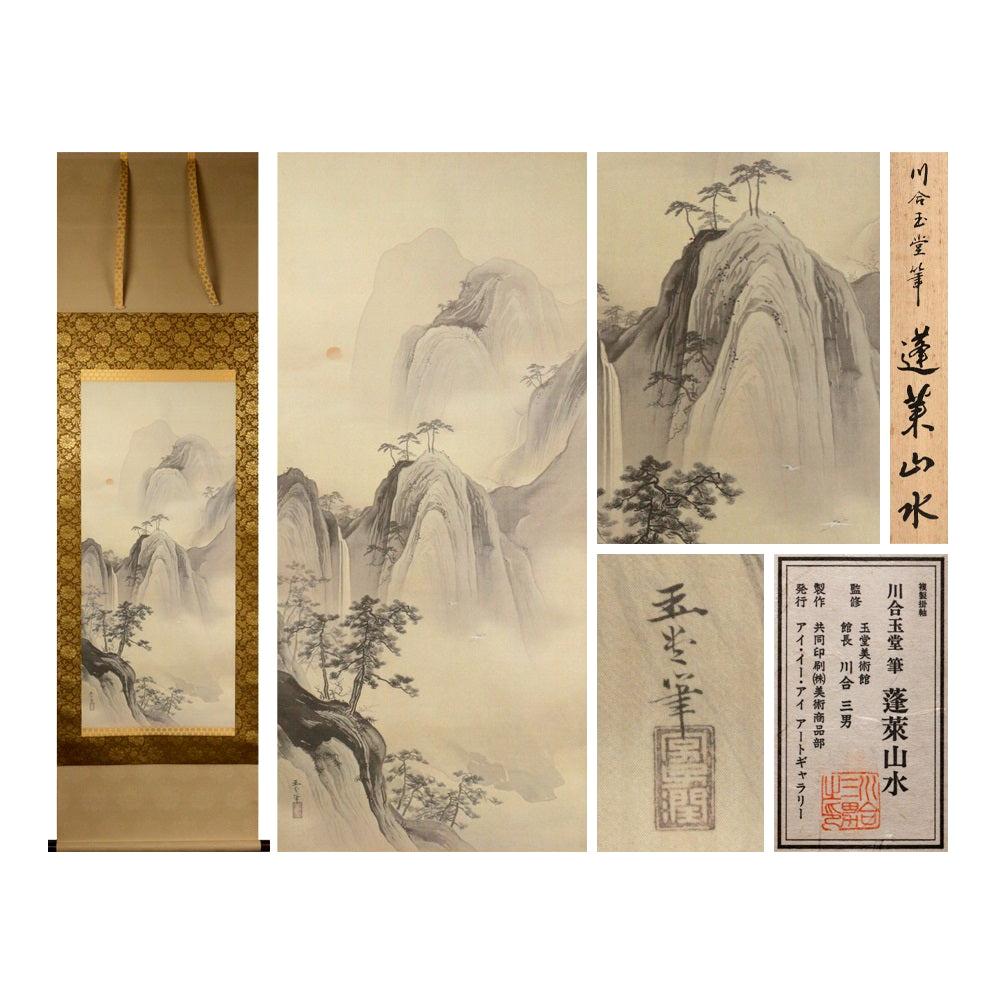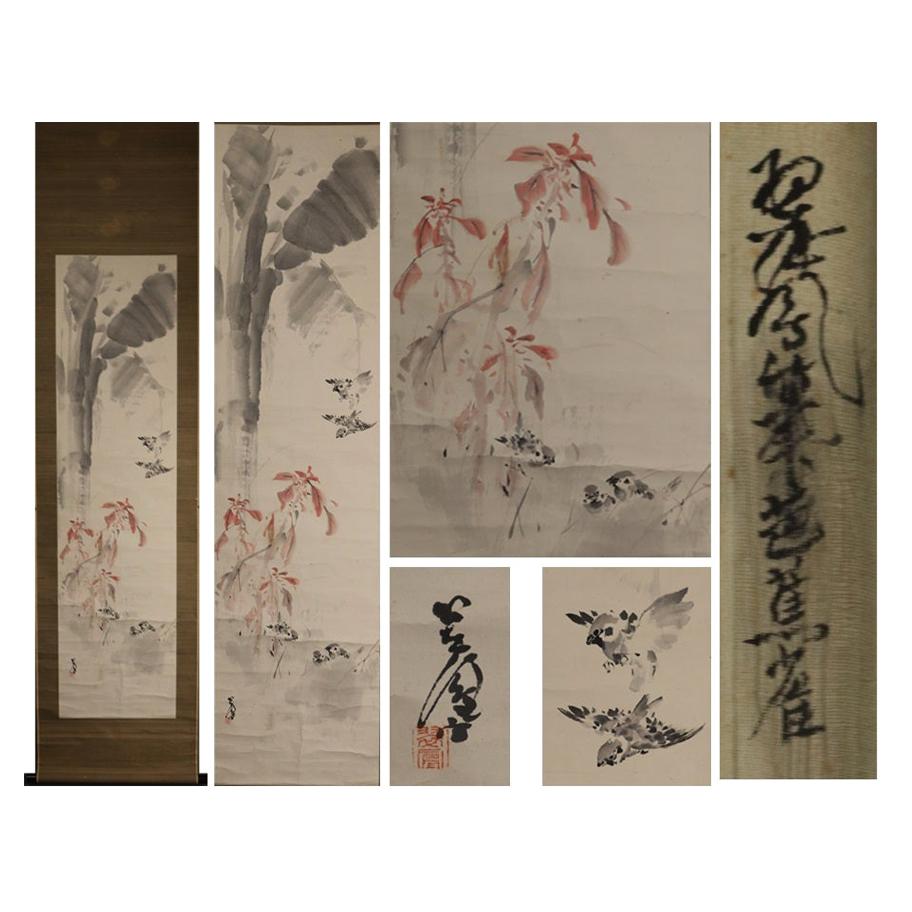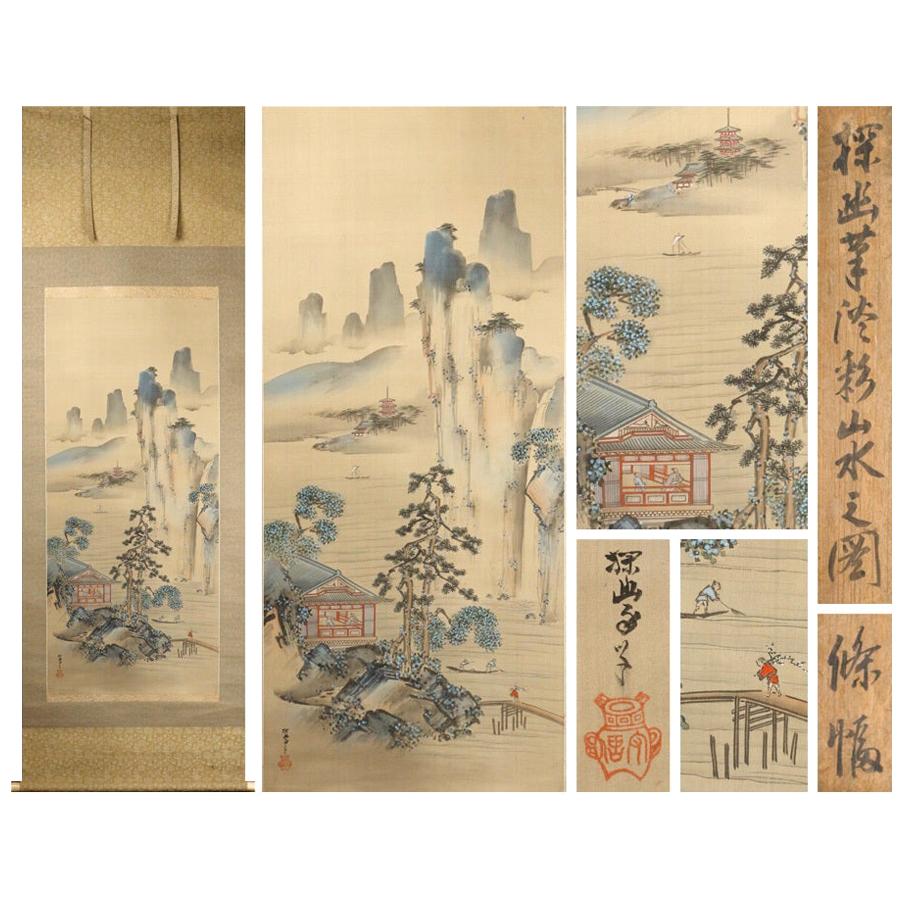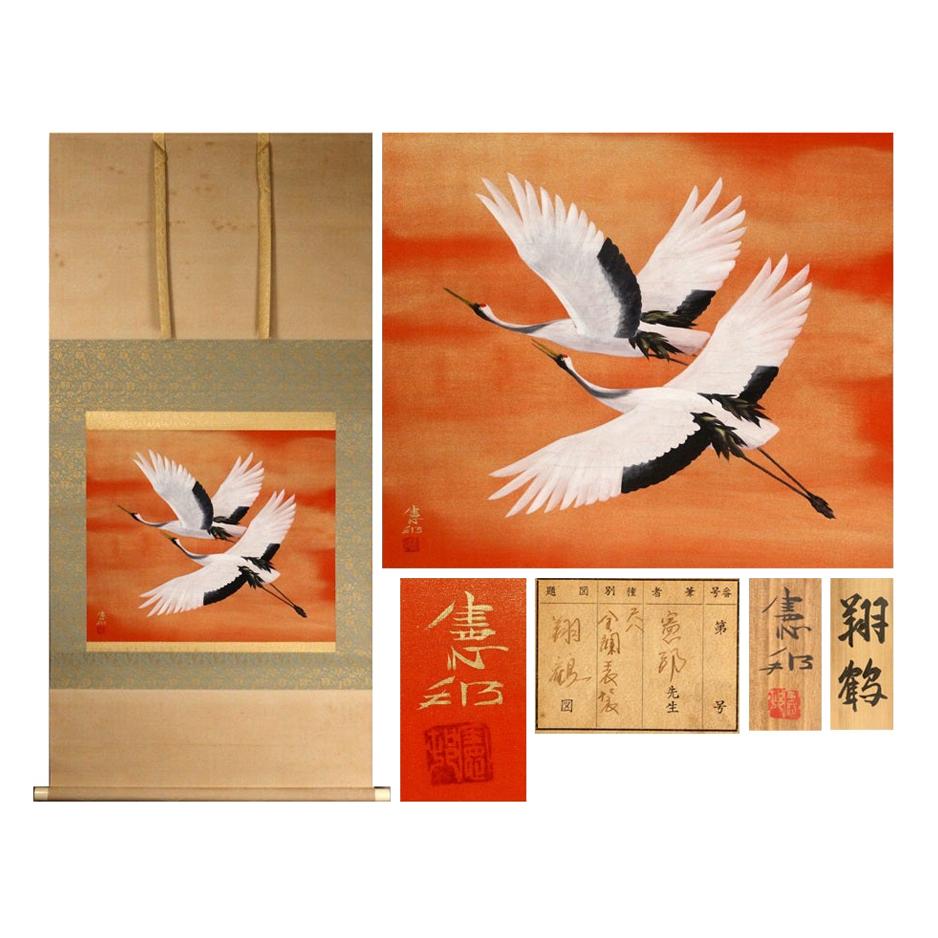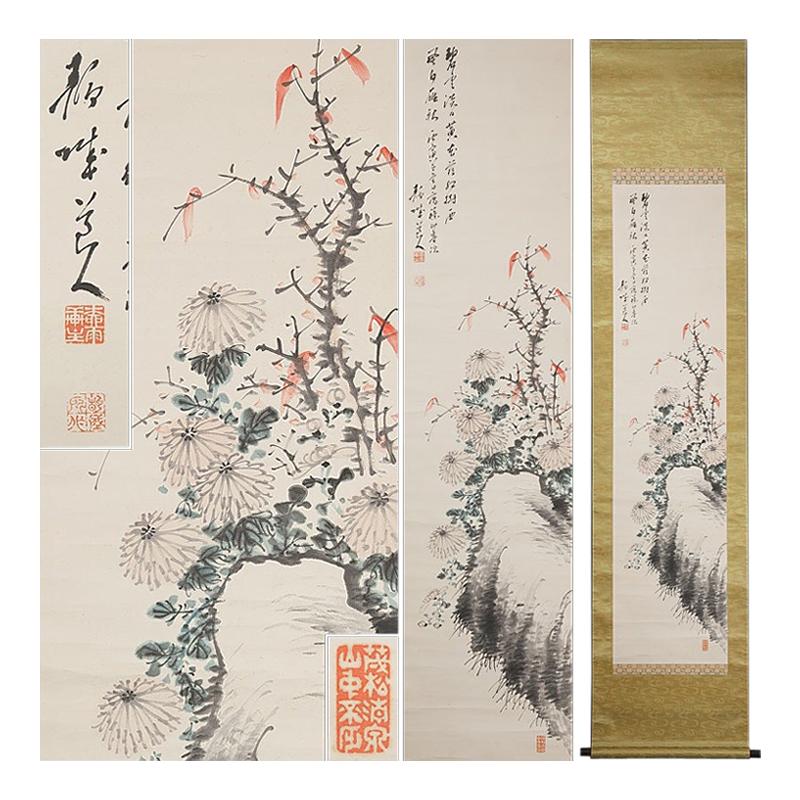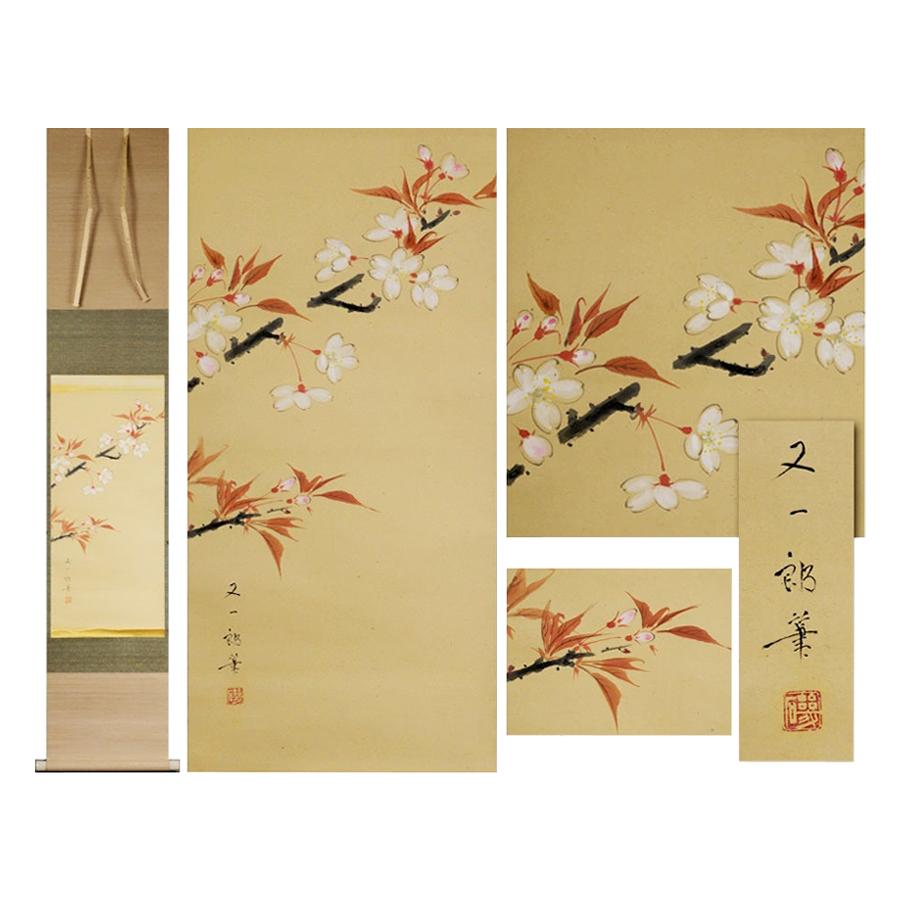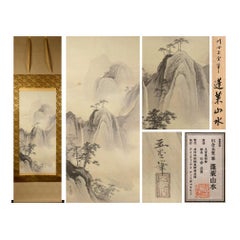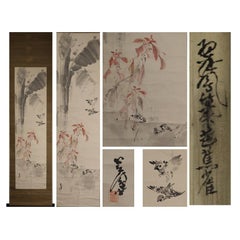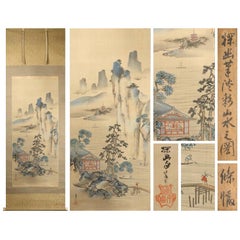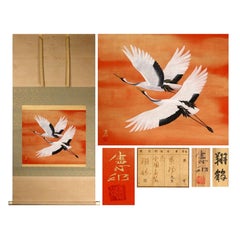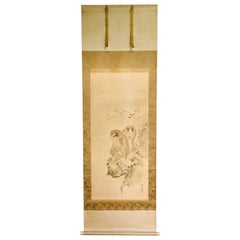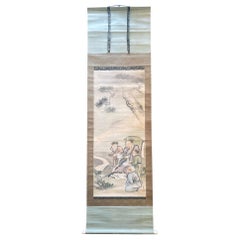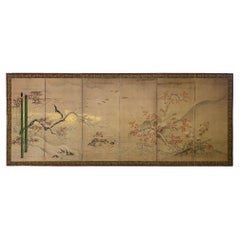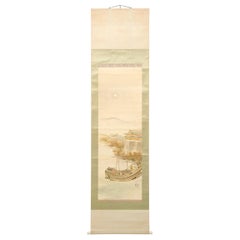Items Similar to Artists Kawai Gyokudō Showa Period Scroll Japan 20c Artist Nihonga
Want more images or videos?
Request additional images or videos from the seller
1 of 5
Artists Kawai Gyokudō Showa Period Scroll Japan 20c Artist Nihonga
$1,909.09
$2,386.3720% Off
£1,420.17
£1,775.2220% Off
€1,592
€1,99020% Off
CA$2,614.20
CA$3,267.7520% Off
A$2,906.64
A$3,633.2920% Off
CHF 1,517.68
CHF 1,897.1120% Off
MX$35,380.84
MX$44,226.0420% Off
NOK 19,365
NOK 24,206.2520% Off
SEK 18,144.08
SEK 22,680.1020% Off
DKK 12,119.02
DKK 15,148.7720% Off
Shipping
Retrieving quote...The 1stDibs Promise:
Authenticity Guarantee,
Money-Back Guarantee,
24-Hour Cancellation
About the Item
Kawai Gyokudo (?? ??, November 24, 1873-June 30, 1957) was the pseudonym of a Japanese painter in the Nihongo school, active from Meiji through Showa period Japan. His real name was Kawai Yoshisaburo.
Contents
Biography
Gyokudo was born in what is now Ichinomiya city, Aichi Prefecture, as the eldest son of a paper, ink and brush merchant. He went to Kyoto in 1887 to study under Kono Bairei of the Maruyama-Shijo school of painting. In 1896, he moved to Tokyo and he became the student of Hashimoto Gaho, of the Kano school. He also studied Western-style painting and developed a highly personal style, especially in the field of landscape painting.
Gyokudo is noted for his polychrome and occasionally monochrome works depicting the mountains and rivers of Japan in the four seasons, with humans and animals shown as part of the natural landscape. Among his representative works are Futsuka zuki (“The New Moon”), Yuku haru (“The Departing Spring”), Mine-no-yu (“Evening at the Mountain Top”), and Bosetsu (“Snow in the Evening”).
In 1898, Gyokudo joined with Okakura Tenshin and Yokoyama Taikan to found the Nihon Bijutsuin (Japan Fine Art Academy). In 1907, Gyokudo was selected as a judge for the first annual Bunten Exhibition. He became a teacher at the Tokyo Bijutsu Gakko (the forerunner of the Tokyo National University of Fine Arts and Music) in 1919.
In 1940, he was awarded the Order of Culture by the Government of Japan.
Most of his works are preserved and displayed at the Gyokudo Art Museum, in Ome, Tokyo.
As you can see, "High-class crafts" Kawai Gyokudo's "Kaki autumn leaves".
It is a simple yet warm "Kaki autumn leaves", and it is
a work in which the details of a private house are carefully drawn.
¦ Silk books and crafts.
¦ Condition
There is me etc.
¦ Shaft dimensions / approx. 136.5 cm x approx. 67.0 cm.
¦ Paper dimensions / approx. 39.0 cm x approx. 52.5 cm.
¦ Signs / There are inscriptions and seals as you can see.
¦ Box / Box.
- Dimensions:Height: 53.75 in (136.5 cm)Width: 26.38 in (67 cm)Depth: 0.04 in (1 mm)
- Style:Taisho (Of the Period)
- Materials and Techniques:
- Place of Origin:
- Period:
- Date of Manufacture:20th Century
- Condition:Wear consistent with age and use. ■ Silk book. ■ The condition is beautiful. ■ Shaft dimensions / approx. 181.0 cm x approx. 53.0 cm. ■ Painting dimensions / approx. 90.0 cm x approx. 40.0 cm. ■ Signs / There are inscriptions and seals as you can see. ■ Box / Box.
- Seller Location:Amsterdam, NL
- Reference Number:Seller: 1330917030031stDibs: LU4863223186722
About the Seller
5.0
Platinum Seller
Premium sellers with a 4.7+ rating and 24-hour response times
Established in 2015
1stDibs seller since 2019
264 sales on 1stDibs
Typical response time: 2 hours
- ShippingRetrieving quote...Shipping from: Amsterdam, Netherlands
- Return Policy
Authenticity Guarantee
In the unlikely event there’s an issue with an item’s authenticity, contact us within 1 year for a full refund. DetailsMoney-Back Guarantee
If your item is not as described, is damaged in transit, or does not arrive, contact us within 7 days for a full refund. Details24-Hour Cancellation
You have a 24-hour grace period in which to reconsider your purchase, with no questions asked.Vetted Professional Sellers
Our world-class sellers must adhere to strict standards for service and quality, maintaining the integrity of our listings.Price-Match Guarantee
If you find that a seller listed the same item for a lower price elsewhere, we’ll match it.Trusted Global Delivery
Our best-in-class carrier network provides specialized shipping options worldwide, including custom delivery.More From This Seller
View AllArtists Kawai Gyokudō Showa Period Scroll Japan 20c Artist Nihonga
Located in Amsterdam, Noord Holland
Kawai Gyokudo (?? ??, November 24, 1873-June 30, 1957) was the pseudonym of a Japanese painter in the Nihongo school, active from Meiji through Showa period Japan. His real name was Kawai Yoshisaburo.
Contents
Biography
Gyokudo was born in what is now Ichinomiya city, Aichi Prefecture, as the eldest son of a paper, ink and brush merchant. He went to Kyoto in 1887 to study under Kono Bairei of the Maruyama-Shijo school of painting. In 1896, he moved to Tokyo and he became the student of Hashimoto Gaho, of the Kano school. He also studied Western-style painting and developed a highly personal style, especially in the field of landscape painting.
Gyokudo is noted for his polychrome and occasionally monochrome works depicting the mountains and rivers of Japan in the four seasons, with humans and animals shown as part of the natural landscape. Among his representative works are Futsuka zuki (“The New Moon”), Yuku haru (“The Departing Spring”), Mine-no-yu (“Evening at the Mountain Top”), and Bosetsu (“Snow in the Evening”).
In 1898, Gyokudo joined with Okakura Tenshin and Yokoyama Taikan...
Category
20th Century Japanese Taisho Paintings and Screens
Materials
Silk
$1,909 Sale Price
20% Off
Artists Suiho Yano Showa Period Scroll Japan 20c Artist Nihonga
Located in Amsterdam, Noord Holland
As you can see, it is a work of "Basho / Sparrow" drawn by Midori Yano.
Under Basho, this work skillfully depicts the appearance of sparrows forming a flock and singing food.
«Su...
Category
20th Century Japanese Taisho Paintings and Screens
Materials
Silk
$1,141 Sale Price
20% Off
Lovely 17th-18th Century Scroll Painting Japan Artist Kano Soyu Painted
Located in Amsterdam, Noord Holland
It is a work that is said to have been drawn by Kano Soyu as you can see.
It is a picture of the light-colored Sansui map carefully drawn to the smallest detail, and the
towering m...
Category
Antique 17th Century Japanese Edo Paintings and Screens
Materials
Silk
$3,021 Sale Price
20% Off
Artists Norikuni Kawamura, Showa Period Scroll Japan 20c Artist Nihonga
Located in Amsterdam, Noord Holland
As you can see, it is a double box and a box with "Shokakuzu" written by Norikuni Kawamura.
The
"Shokaku-zu", which is composed of graceful textures, spreads its wings and flies, i...
Category
20th Century Japanese Showa Paintings and Screens
Materials
Silk
$1,141 Sale Price
20% Off
Cherry Blossoms Showa Period Scroll Japan 20c Artist Mataichiro Isoda Nihonga st
Located in Amsterdam, Noord Holland
Name Kakejiku Calligraphy Kikuzu Paper Book Coloring Inscription (Shizushiro)
Size Axis: 195 cm in length, 42.5 cm in width, 131.5 cm in length, 31.5 cm in width *
Status I don't k...
Category
20th Century Japanese Showa Paintings and Screens
Materials
Silk
$748 Sale Price
20% Off
Cherry Blossoms Showa Period Scroll Japan 20c Artist Mataichiro Isoda Nihonga St
Located in Amsterdam, Noord Holland
Born in Kyoto, Isoda Mataichirô studied painting at the Kyoto City Specialist School of Painting. After graduating there he studied Japanese-style painting with Kikuchi Keigetsu. Though primarily a painter he also made a number of woodblock designs for Unsôdô in Kyoto.
is a very beautiful work in which the cherry blossoms in full bloom are drawn by the master, Mataichiro Isoda .
"Mataichiro Isoda"
Japanese-style painter. Born in Kyoto.
Graduated from Kyoto City University of Arts, Department of Painting in 1914, and Kyoto City University of Arts in 1933
. Advance to the graduate school and complete. He studied under Keigetsu Kikuchi and was selected for the first time in the 8th Imperial Exhibition in 1945 with "Yin".
Since then, he has been selected for the Imperial Exhibition, the Reorganized Imperial Exhibition, and the Nitten Exhibition almost every time.
After the war, he was selected from the 3rd
Nitten Exhibition in 1947, and "Chatei Liqiu" was selected at the 5th Exhibition in 1945. Since then, he will win an exhibition prize every time.
1956 Participated in the formation of Shirakosha by Uda Tekison,
and exhibited at regular exhibitions until 1966 . Nitten party friend.
During this time, he was a professor at Kacho Girls' High School from 28 to 1955.
e specializes in flower and bird...
Category
20th Century Japanese Showa Paintings and Screens
Materials
Silk
$1,707 Sale Price
20% Off
You May Also Like
Japanese Silk Scroll Painting of Moneys Edo Period Mori Tetsuzan
Located in Atlanta, GA
A Japanese mounted vertical hanging scroll painting by Mori Tetsuzan (Japanese, 1775-1841) circa 19th century Edo period. The watercolor and ink on silk ...
Category
Antique 19th Century Japanese Japonisme Paintings and Screens
Materials
Silk, Paper
Japanese Silk Scroll by Haruki Nanmei Edo Period
Located in Atlanta, GA
A Japanese hanging silk scroll by late Edo period painter Haruki Nanmei (1795-1878). The gouache painting was in the tradition of Kano school and depicts an old scholar dressed in lo...
Category
Antique 19th Century Japanese Edo Paintings and Screens
Materials
Silk, Paper
Edo Period Seasonal Transition Screen
Located in Fukuoka, JP
Edo Period Seasonal Transition Screen
Period: Edo
Size: 368 x 153 cm
SKU: PTA148
This exquisite six-panel screen, adorned with golden flakes, beautifully portrays the seamles...
Category
Antique 19th Century Japanese Edo Paintings and Screens
Materials
Gold Leaf
Japanese Meiji Riverside Scroll Painting, c. 1900
Located in Chicago, IL
Although western painting was initially embraced during Japan’s Meiji period (1868-1912), artists brought on a revival of traditional painting styles as they sought to create a modern Japanese style with roots in the past. This exquisite hanging scroll demonstrates the preference for soft layering of gray tones with judicious use of color. The landscape is rendered in soft ink washes that subtly distinguish between water, mountain, and sky. The scroll painting...
Category
Early 20th Century Japanese Meiji Paintings and Screens
Materials
Paper
Edo Period (19th) Japanese antique painting of flowers
Located in Fukuoka, JP
Japanese antique painting of flowers 19 C
Weight 3kg ( 6.6lb)
Category
Antique Mid-19th Century Japanese Edo Paintings and Screens
Materials
Silk, Paper
Japanese Landscape Painting, Hanging Scroll Painting
Located in Greenwich, CT
Japanese scroll painting of landscape painting depicted village along the riverside in the mountains with fisherman
Ink and color on silk
Overall size...
Category
Antique 19th Century Japanese Paintings and Screens
Materials
Silk
More Ways To Browse
Ink Scroll
Japanese Scroll Art
Japanese Brushes
Japanese Paper Scroll
Arts And Crafts Screen
Japanese Silk Painting 20th Century
Silk Japanese Scrolls
Japanese Silk Painting Ink
Four Seasons Screen
Japanese Screens Mountains
Japanese Scroll Box
Japanese Screen Kyoto
Japanese Showa Screen
Kano School
Japanese Silk Art Landscape
Vintage Autumn Leaves
Japanese Scroll Landscape Painting
Kyoto Screens
